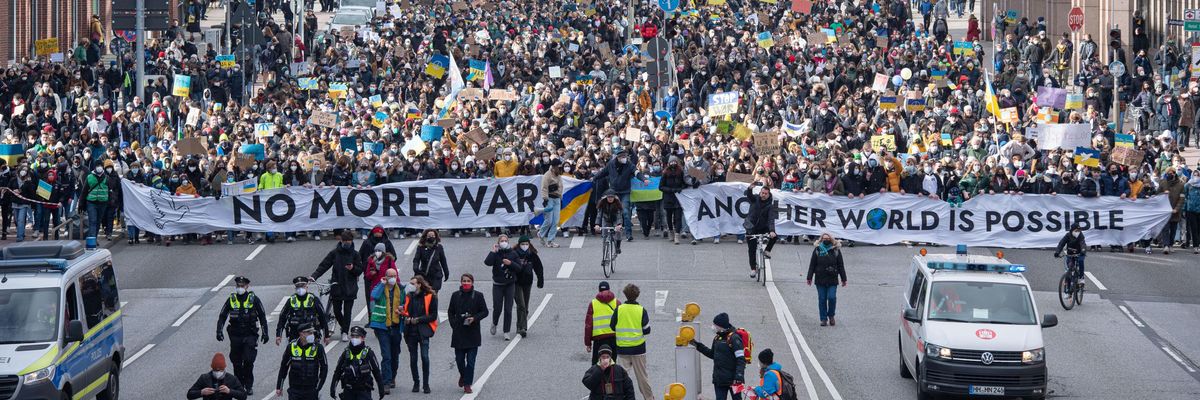During the first days of the Ukraine war, former Senator Sam Nunn warned that the Ukraine War was a Cuban Missile Crisis in slow motion. That warning was recently reiterated by senior analysts in Moscow during an off the record conversation. The war is about Ukraine and much more: power, privileges, the security disorder in Europe; the future of Putin's rule; and Biden/Blinken efforts to reinforce U.S. hegemony in the face of pressures for a bipolar or multi-polar world disorder.
We thus face a long war, with the danger of spiraling escalations that bring us eyeball to eyeball in great power and nuclear confrontation.
While debate rages on the Internet, it is clear that Putin's ill-conceived, illegal, and brutal invasion of Ukraine was triggered by a combination of frustrated Russian imperial ambitions and Washington's arrogant expansion of NATO to Russia's borders. The turning point came in 2008 when, against French and German opposition and Fiona Hill's admonitions, W. Bush pressed NATO to extend its welcome mat to Ukraine and Georgia. With the history of Napoleon's, the Kaiser's, and Hitlers invasions from the West, powerful--if illegal--pushback from Moscow was inevitable. And now we have a proxy war, with the U.S. and NATO committed to weakening Russia and reinforcing U.S. European hegemony.
Despite Putin's statements to the contrary, former senior Russian officials concede that recent Russian losses in the Kharkiv region have created political problems for Putin. Add to that Xi's and Modi's steps to begin distancing their nations from the war. Even before Putin issued new threats and President Biden warned against escalation and possible use of WMD's, Russian advisors and former generals predicted that escalation would be the inevitable response. Russians, they said, will "do anything necessary to win." Despite Biden's "Don't. Don't. Don't", the specter of possible nuclear, as well as chemical weapons, attack casts its shadow over the war and humanity as a whole. Even if neither side opts to launch nuclear war, as we learned during the Cuban Missile Crisis, presidents do not have complete control over their nuclear arsenals, and accidents, miscalculation and insubordination can happen.
Just as the military doctrines and political ineptness of the European powers transformed the 1914 guns of August into a World War, Russian and U.S. nuclear arsenals and doctrines should alarms us all. Russian nuclear doctrine calls for the use of nuclear weapons if and when the Russian state is in jeopardy, and Putin is the Russian state. Were this to become an extended war that more seriusly bleeds Russian resources and power, or were Russian forces to face possible major military defeat, Putin could launch tactical nuclear weapons to terrorize Kyiv into suing for peace. U.S. doctrine, as manifested in the Biden Administration's Nuclear Posture Review, mandates possible use of nuclear weapons when U.S. vital interests and those of its allies and partners are threatened. Russia's use of tactical nuclear weapons could thus trigger a cataclysmic nuclear exchange.
In conversations with senior Russians, we hear that accepting anything less than Putin's minimum demands (ensuring secure control of the Donbas and Crimea and creation of Ukraine as a neutral state), would undermine his ability to remain in power. This summer, in an off the record meeting one of the most senior Democratic members of Congress reiterated that he was willing to risk nuclear war to ensure that Kyiv regains control of its Black Sea coast. President Zelensky, backed by NATO Secretary General Stoltenberg, is committed to fighting to liberate all of Russian occupied Ukraine. And in Washington, Congressional Democrats are all in for the war, with the vast majority even opposed to urging Biden to complement his billions of dollars of arms transfers to Ukraine with an appeal for a ceasefire and negotiations.
We thus face a long war, with the danger of spiraling escalations that bring us eyeball to eyeball in great power and nuclear confrontation.
We live in a dark and dangerous time. But the Canadian poet and songwriter Leonard Cohen taught that "there is a crack in everything/that's how the light get's in." Our responsibility is to continue pressing for a ceasefire and negotiations leading the creation of a secure and neutral Ukraine, to the creation of a new and just European security architecture, and building on the lessons from the last Cold War to recreate U.S. Russian detente despite our differences. With enough pressure, we may force the Powers That Be to find the compromises midst the cracks in their imperial commitments that secure our future.




